




to the fourteenth issue of the annual Biosphere Expeditions Magazine.


With the pandemic at a stage where we could start running expeditions again from March 2023, we initially thought we would create a happy-clappy issue called “Resurrection”, showing lots of people having fun on expeditions again and how our local partners survived to work with us once more. Then the summer in the northern hemisphere happened with searing heat, droughts, wildfires, coral bleaching and more – conditions that many scientists predicted for the 2030s, not now. It is clear that the climate emergency has arrived. It is ahead of schedule and it is hitting humanity as hard as science has predicted for decades, or harder – but certainly earlier.
In the last issue we talked about the 2020s being the crucial decade to turn around this supertanker heading for the wall at full speed. This still holds true, but now with more urgency. We – society, governments and each and every one of us –need to take action now. So this is not the time for pretending things are “back to happy normal” again. This is the time to call a spade a spade, to talk about the elephant in the room, the dire straits humanity is in. The planet does not care and will continue to exist, it has weathered bigger storms than the one created by humankind today. The question is whether humanity and civilisation as we know it will survive. It is on a knife edge and the outlook is not good. The time has come to fight –
against the deniers, the corporations and their willing helpers in government that put profit before the survival of civilisation, and our own tardiness to change our comfortable lifestyles. We all need to make changes individually (see the Top 5 on page 50) and we need to change the system, because this is a make or break moment.
So this issue is a reality check on the situation we find ourselves in, an attempt to reach those who are in their comfortable ‘it ain’t that bad / recycling is enough’ bubbles. It is not enough and it is bad. Read the articles and you will see, then take action! If you want, take our Top 5 tips as a starting point – stop eating meat, get rid of your car, stop flying (to expeditions and instead select a more local one), come off the fashion bandwaggon and become an activist! We need 3.5% of the population to reshape society and we need to do it now. Indeed, I believe that if we want to be able to look our grandchildren in the eye, then we have a duty to act to save humankind and civilisation from sliding into destruction.
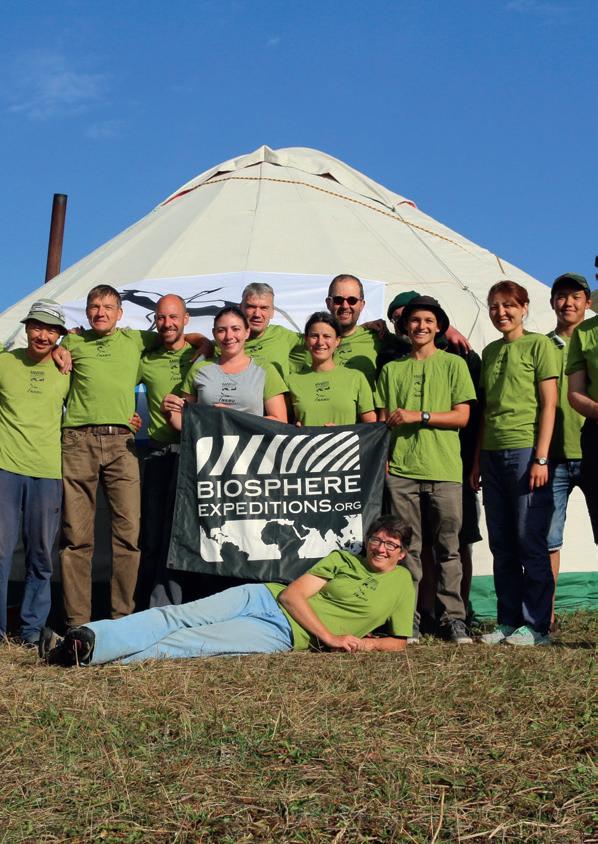
Our planet is in crisis, with nature under attack like never before. We believe everyone has the power to change this. We are mindful of nature and empower people through citizen science and hands-on wildlife conservation. We are a non-profit, visionary, award-winning and ethical conservation organisation. We are a member of the IUCN and the UN's Environment Programme. Working hand-in-hand with local biologists and communities, we champion change and protect nature. And we succeed - the creation of protected areas on four continents is just one example.
Come and join us! Make your holiday time count as a wildlife volunteer and share in our vision of a healthier planet. Whatever your age or background, make your voice heard and spend a week or more on a wildlife conservation expedition with us. Travel with us to remote and beautiful places, learn new skills, meet like-minded people from around the world and experience conservation in action. Together - for nature, not profit - let's act like our world depends on it. Because it does.
Bürgerwissenschaft | nachhaltiges Reisen | ethische Abenteuer | Artenschutz
Unser Planet steckt in der Krise - noch nie stand die Natur so unter Druck. Wir glauben daran, dass es in der Macht jedes einzelnen liegt, das zu ändern. Wir achten auf die Natur und befähigen Menschen sie zu schützen - durch Bürgerwissenchaft und angewandten Naturschutz. Wir sind eine gemeinnützige, visionäre und nach ethischen Standards handelnde Naturschutzorganisation. Wir sind Mitglied der IUCN und des UN-Umweltprogramms. Wir arbeiten Hand in Hand mit Menschen und Biologen vor Ort in unseren Projektgebieten, setzen uns für einen Wandel ein und schützen unser aller Natur. Und unser Konzept ist erfolgreich – die Einrichtung von Schutzgebieten auf vier Kontinenten ist nur ein Beispiel.
Helfen Sie mit und gestalten Sie Ihre Urlaubszeit besonders wertvoll. Teilen Sie unsere Vision eines intakteren Planeten und verschaffen Sie Ihrer Stimme Gehör als Teilnehmer an unseren Natur- und Artenschutzexpeditionen. Erfahren Sie - für eine Woche oder auch länger - Neues an wunderschönen, entlegenen Orten, erwerben Sie neue Fähigkeiten, treffen Sie Gleichgesinnte aus der ganzen Welt und erleben Sie Natuschutz hautnah. Lassen Sie uns gemeinsam so handeln, als hinge das Wohl des Planeten von uns ab - denn genau das tut es.
Notre planète est en crise – jamais encore la nature n’a autant été en danger. Chacun a le pouvoir de changer les choses. Nous en avons conscience, et c’est pour cela que nous donnons les moyens nécessaires aux hommes de la préserver, au travers d’actions participatives et scientifiques, sur le terrain. Nous sommes une organisation à but non lucratif, visionnaire, plusieurs fois récompensée, éthique et durable, qui vise à promouvoir la protection de la nature. Nous sommes également membres de l’IUCN (Union internationale pour la conservation de la nature) et du programme des Nations Unies pour l'environnement. Nous travaillons main dans la main avec les communautés et les biologistes locaux. Nous incitons au changement et protégeons la nature. Nos efforts sont couronnés de succès : la création d’espaces protégés sur l’ensemble des quatre continents est juste un exemple de tout ce que nous avons réussi à accomplir.
Rejoignez-nous et donnez de votre temps. Partagez notre vision d’une planète préservée. Quel que soit votre âge ou vos compétences, faites compter votre voix et participez à une mission pour la préservation de la nature pendant une semaine ou plus. Partez avec nous vers des endroits magnifiques et reculés. Développez vos connaissances et rencontrez des personnes du monde entier, qui ont la même volonté que vous. Participez concrètement à la préservation de la nature. Ensemble, agissons pour le bien de notre planète car notre futur en dépend.



Biosphere Expeditions employs a global team of wildlife professionals who all contribute to the success of the organisation: expedition leaders, scientists, field-based and administrative staff. Their roles are as diverse as their backgrounds, but they all share a love of the outdoors and wildlife.


Here are just two of our team. More can be found at www.biosphere-expeditions.org/staff.
Roland Arnison studied Environmental Science and is a qualified Mountain Leader, a Mountain Rescue volunteer and has led on a variety of expeditions in the UK, Canada, Iceland and Namibia, including introducing young people to the joys and challenges of expeditions in wild places. He has run expedition citizen science projects ranging from sampling for plastic pollution in the ocean to searching for the elusive Collared Pika in the Yukon as a bio-indicator of climate change. Roland’s mountaineering exploits have taken him to unclimbed peaks in the Himalayas and equally challenging times in the Scottish hills in winter. Roland enjoys kayaking, climbing, cycling, filming, photographing, diving and sometimes just walking in some wonderful and wild parts of the world. He has also spent many years looking after a smallholding in Yorkshire, creating wildlife habitats, and experimenting with novel food growing and renewable energy projects.
Taalai M ambetov is Kyrgyz and holds a Master’s degree from the Faculty of Biology, Kyrgyz National University. He began his scientific career as a junior researcher at the National Academy of Sciences. Since 2017 he has been a teacher and field biologist at his alma mater. Taalai has participated in various projects (ICBA, FFI, Kew Botanical Garden project etc.), mainly related to biodiversity, and in 2022 took over from Dr. Volodya Tytar (who has now retired) as the Tien Shan expedition scientist.


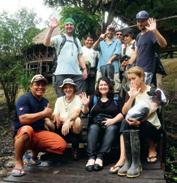














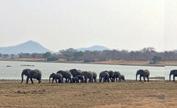








The climate emergency has been declared over and over. The future the scientists warned us about is here, now. We are declaring a climate emergency. Everyone can, in whatever place on Earth they call home. No one needs to wait for politicians any more – we have been waiting for them for decades. What history shows us is that when people lead, governments follow. Our power resides in what we are witnessing. We cannot deny that Great Salt Lake is vanishing before our eyes into a sun-cracked playa of salt and toxic chemicals. Nor can we deny that this summer Europe and North America burnt and sweltered in unbearable heat. The future the scientists warned us about is where we live now.

The climate emergency has been declared over and over by Nature and by human suffering and upheaval in response to its catastrophes. The 2,000 individuals who recently died of heat in Portugal and Spain are not here to bear witness, but many of the residents of Jacobabad in Pakistan, where Amnesty International declared the temperatures “unlivable for humans”, are. The heat-warped rails of the British train system, the buckled roads, cry out that this is unprecedented. The estimated billion sea creatures who died on the Pacific north-west’s coast from last summer’s heatwave announced a climate emergency. The heatdevastated populations of southern Asia, the current grain crop failures in China, India, across Europe and the American Midwest, the starving in the Horn of Africa because of climate-caused drought, the bleached and dying coral reefs of Australia, the rivers of meltwater gushing from the Alps and the Greenland ice sheet, the melting permafrost of Siberia and Alaska: all bear witness that this is a climate emergency. So do we. Yet the anxiety we feel, the grief that is ours, pales in comparison to the ferocity of our resolve.
We can choose to live differently and build wiser and more just ways to produce, consume and travel. Our hope lies in our collective actions. A climate emergency means that it’s time for business as usual to halt, for our priorities to shift and to recognise our responsibility to those on the frontlines of the climate crisis. This emergency, which did not begin suddenly and will not end in our lifetimes, nevertheless needs our urgent response. This means doing all we can to stabilise the health of the planet and speed the transition away from fossil fuels. Now. Between the scientists and engineers,

philosophers and poets, indigenous leaders, climate activists and engaged youth, we know what to do and how to do it. We have a multiplicity of tools, we have a kaleidoscopic vision where each of us can offer up the gifts that are ours, and most importantly, we have the spiritual will to change the course of our destiny on fire.
The future needs us. We need each other. At a time when the majority of us want to see serious climate action, too many politicians have failed us and undermined those who are trying. We ourselves must respond for those who will be born next week and next decade and next century, who need a planet alive and flourishing in all its exquisite diversity of land and creatures and humans. We have no right to rob them or the young people staring at a chaotic future now of their birthright. We do not represent them, but we can represent ourselves, as people in solidarity with all life. In that spirit, we join those around the world who have already declared a climate emergency, and we invite everyone to join us. ■

in cooperation with
Ways of the desert: Conserving Arabian oryx, Gordon’s wildcat, sand fox & other species in the iconic sandy desert landscape of Arabia

This Arabian oryx and desert species conservation volunteer expedition to Dubai (UAE) will take you to the fascinating and iconic sandy desert landscape of the Arabian Peninsula. Working alongside scientists from the Dubai Desert Conservation Reserve, you will be part of a small international team, monitoring Arabian oryx, Gordon's wildcat, red and sand fox, Arabian and sand gazelles, as well as other flagship species of the desert. From a comfortable oasis field camp, you will venture out in the expedition 4WDs and on foot to study antelope behaviour and social structures, camera- and live-trap Gordon's wildcat, red and sand fox, and monitor them by radio and GPS telemetry. All this to ensure the survival of these important flagship desert species in their beleaguered world.
Expedition contributionDurationTime of yearMeeting point
€ 1770 8 daysJan 2023 Dubai
More info and exact dates www.biosphere-expeditions.org/arabia







It feels like the end game. In the US, the third perverse and highly partisan supreme court decision in a few days made American efforts to prevent climate breakdown almost impossible. Ruling in favour of the state of West Virginia, the court decided that the Environmental Protection Agency is not entitled to restrict carbon dioxide emissions from power stations.
The day before, in the UK, the government’s climate change committee reported a “shocking” failure by Boris Johnson’s administration to meet its climate targets. So stupid and perverse are its policies on issues such as energy saving that it’s hard to see this as anything other than failure by design. On the day of the supreme court ruling, the UK government also announced that it intended to scrap the law protecting the UK’s most important wildlife sites.
Pumping raw sewage into the sea is a recent example of the rollback of environmental protection laws in the face of climate and ecological breakdown. © Jeff Buck

But the final straw for me was a smaller decision. After two decades of disastrous policies that turned its rivers into open sewers, Herefordshire county council, following a shift from Tory to independent control, finally did the right thing. It applied to the government to create a water protection zone, defending the River Wye against the pollution pushing it towards complete ecological collapse. But in a letter published last week, the UK’s environment minister, Rebecca Pow, refused permission, claiming it “would impose new and distinct regulatory obligations on the farmers and businesses within the catchment”. This is, of course, the point.
It’s the pettiness of the decision that makes it so shocking. Even when the cost to the government is small, it seems determined to destroy everything good and valuable about this country. It’s as if, when ministers go to bed, they ask themselves, “What have I done to make the UK a worse place today?”
Just at the point at which we need a coordinated global effort to escape our existential crises – climate breakdown, ecological breakdown, the rising tide of synthetic chemicals, a gathering global food emergency – those who wield power string razor wire across the exit.
When I began work as an environmental journalist in 1985, I knew I would struggle against people with a financial interest in destructive practices. But I never imagined that we would one day confront what appears to be an ideological commitment to destroying life on Earth. The UK government and the US supreme court look as if they are willing the destruction of our life support systems.
The supreme court’s ruling was neither random nor based on established legal principles. It arose from a concerted programme to replace democracy in the US with judicial dictatorship.
As Senator Sheldon Whitehouse has documented, hundreds of millions of dollars in dark money (funds whose sources are unknown) were poured into the nomination and confirmation of the three judges appointed to the court by Donald Trump. Among the groups leading these campaigns was Americans for Prosperity, set up by the Koch brothers: oil tycoons with a long record of funding radical rightwing causes. As an investigation by Earth Uprising shows, there’s a strong correlation between the amount of oil and gas money US senators have received, and their approval of Trump’s supreme court justice nominations.
Once the favoured justices were in place, the same networks started using their financial power to steer their decisions. They do so through “amicus briefs”: advice notes to the court supporting a plaintiff’s position. The judicial process is meant to be unswayed by political pressure, but amicus briefs have become one of the most powerful of all lobbying tools. As Whitehouse points out, the funders of these briefs are “not just ‘friends of the court’ – in many cases, they are quite literally friends of the judges they have put on the court”.
While some oligarchs lobby within the judicial system, others operate to great effect outside it, distorting public perceptions about such rulings through a barrage of propaganda in the media. No one, arguably, has done more to stymie effective environmental action than Rupert Murdoch.
In this case, the supreme court has strayed way beyond its mandate of interpreting the law, into the territory of the executive and the legislature: making the law. It is imposing policies that would never survive democratic scrutiny, if they were put to the vote. By seizing control of regulatory power, it sets a precedent that could stymie almost any democratic decision.
All this might seem incomprehensible. Why would anyone want to trash the living world? Surely even billionaires want a habitable and beautiful planet? Don’t they like snorkelling on coral reefs, salmon fishing in pristine rivers, skiing on snowy mountains? We suffer from a deep incomprehension of why such people act as they do. We fail to distinguish preferences from interests, and interests from power. It is hard for those of us who have no desire for power over others to understand people who do. So we are baffled by the decisions they make, and attribute them to other, improbable causes. Because we do not understand them, we are the more easily manipulated.
The media often represent politicians’ interests as if they were mere political preferences. Very rarely is the lobbying and political funding behind a decision explained in the news. The Conservatives don’t permit intensive livestock units and sewage treatment works to pour filth into rivers because they like pollution.

They do so on behalf of the powerful interests to whom they feel obliged, such as the water companies and their shareholders, the farming lobbies and the billionaire press.
But even financial interests fail fully to explain what’s going on. The oligarchs seeking to stamp out US democracy have gone way beyond the point of attending only to their net worth. It’s no longer about money for them. It’s about brute power: about watching the world bow down before them. For this rush of power, they would forfeit the Earth.
All these cases expose the same political vulnerability: the ease with which democracy is crushed by the power of money. We cannot protect the living world, or women’s reproductive rights, or anything else we value until we get the money out of politics, and break up the media empires that make a mockery of informed political consent.
Since 1985, I’ve been told we don’t have time to change the system: we should concentrate only on single issues. But we’ve never had time not to change the system. In fact, because of the way in which social attitudes can suddenly tip, system change can happen much faster than incrementalism. Until we change our political systems, making it impossible for the rich to buy the decisions they want, we will lose not only individual cases. We will lose everything. ■



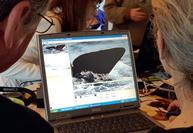

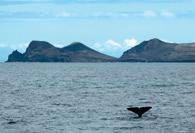

Fascinating creatures of the deep: Studying whales, dolphins and turtles around the Azores archipelago in the Atlantic Ocean

This whale, dolphin and turtle conservation expedition will take you to the remote and spectacular Azores Archipelago in the middle of the Atlantic Ocean to study whales, dolphins and loggerhead turtles. You will photograph sperm, blue, fin, Sei, humpback and minke whales, as well as bottlenose and Risso’s dolphins you come across and record them for local and international monitoring databases. You will also listen to whale and dolphin vocalisations. If sea conditions allow, you may also capture loggerhead turtles in the open ocean using nets and then measure, tag and release them as part of an international tagging programme. All this in an effort to elucidate the animals’ life histories and migration patterns across the oceans and assist with the formulation of effective conservation and management strategies. You will spend the day on a modern catamaran research vessel out at sea and your evenings and nights at an historic and comfortable guesthouse in the town of Horta on Faial Island.
Expedition contributionDurationTime of yearMeeting point €1980 10 daysMar/Apr 2023Horta, Faial Island
More info and exact dates www.biosphere-expeditions.org/azores
First published in the Guardian on 6 June 2022
Acoalition of environmental lawyers, investigative journalists and campaigners has launched a group to challenge the “carbon bomb” fossil fuel projects revealed in a Guardian investigation.
After a meeting in May, more than 70 NGOs and activist groups from around the world have formed a “carbon bomb defusal” network to share expertise and resources in the fight to halt the projects and prevent the catastrophic climate breakdown they would cause.
The Guardian investigation identified 195 carbon bombs, gigantic oil and gas projects that would each result in at least a billion tonnes of CO2 emissions over their lifetimes, in total equivalent to about 18 years of current global CO2 emissions. About 60% of these have started pumping.
The US is the leading source of emissions from these mega projects, with its 22 carbon bombs spanning the deep waters of the Gulf of Mexico to the foothills
If realised, the US will be the leading source of carbon bomb emissions, followed by Saudi Arabia. © L. Franklin (Mount Rushmore) & B. Alotaby (Riyadh skyline).


Combined potential emissions of all carbon bombs versus 1.5C carbon budget. © from the study "“Carbon Bombs”Mapping key fossil fuel projects". Authors of the study: K. Kühne, N. Bartsch, R. Driskell Tate, J. Higson, A. Habet.

of the Front Range in Colorado to the Permian Basin. Together they have the potential to emit 140bn tonnes of CO2, almost four times more than the entire world emits each year.
Saudi Arabia is the second biggest potential emitter after the US, with 107bn tonnes, followed by Russia, Qatar, Iraq, Canada, China and Brazil.
The new campaigning network aims to coordinate legal challenges and activist campaigns against these projects and the companies and politicians supporting them.
Organisers have created www.leave-it-in-the-ground. org and urge other groups of activists, journalists and lawyers to sign up.
“It only takes a handful of dedicated people – lawyers, campaigners, activists – to defuse a carbon bomb,” said Kjell Kühne, from the University of Leeds, who led the carbon bomb research. “And we need such a team for each and everyone of these projects. These will be the epic battles of the ‘keep it in the ground’ movement.”
The 350.org environmentalist group is one of those backing the new campaign. Its chief executive, May Boeve, said: “With our local and global partners [we] are campaigning fiercely to keep fossil fuels in the ground and difuse these carbon bombs to make staying at 1.5 possible, and avoid irreversible and catastrophic climate change. We need to take action at the scale of the crisis by stopping all fossil fuel projects and transitioning to 100% renewables for all.”
Several prominent climate justice groups in the global south are also involved in the new network.
Nnimmo Bassey, from OilWatch Africa, said: “We call for global solidarity against the carbon bombers and work together to stop the expansion of fossil fuels extraction, take direct actions and litigate to ensure that polluters are held to account over their ecological misbehaviours.”
Carroll Muffett, the president of the Center for International Environmental Law, also backed the project, warning the oil majors were “racing to open massive new oil and gas frontiers from South America to southern Africa, asking governments and people across the global south to gamble their futures on fossil fuels when it is clear that fossil fuels have no future.”
Alongside those organisations that have signed up, organisers say other groups of environmental lawyers, investigative journalists and philanthropic funders have expressed an interest in the movement.
Mark Hertsgaard, from Covering Climate Now, a network of more than 500 news outlets, said there had been huge interest from journalists after the Guardian investigation.
“[The carbon bombs investigation] ranks as one of the landmark climate investigations in years, not just because it reveals how fossil fuel companies and governments are giving the finger to humanity’s chances of hitting the 1.5C target, but also because its insights and data offer other newsrooms abundant opportunities for further reporting that can hold the companies and governments accountable and ... stop as many of these carbon bombs as possible.” ■
Gulf to gulf: understanding sea turtles and habitat connectivity of the Pacific coast of Costa Rica

This sea turtle volunteer project will take you to the Golfo Dulce in Costa Rica, one of the world’s most beautiful and biodiverse nature hotspots in the world, and a breeding and nursing ground for whales, dolphins and turtles, as well as a host of other marine and terrestrial wildlife. Working from a locally run and beautiful research station, you will venture out into the gulf in small research vessels every day to capture, measure, weigh and tag Critically Endangered hawksbill and Endangered green turtles, before releasing them back into the water. All this to understand habitat use and migration patterns, as well as reducing major threats for one of the most understudied sea turtle populations in the world. Note that, unlike most sea turtle research programmes, which are carried out on nesting beaches, this project studies turtles in coastal waters, which means frequent and close daytime contact with the animals for genuine research purposes.
Expedition contributionDurationTime of yearMeeting point
€1980 8 daysMay/June 2023Puerto Jiménez
More info and exact dates www.biosphere-expeditions.org/costarica







Gondola trips are a traditional part of visiting Venice for those who can afford the steep tourist prices, but I went a little off-script on a recent visit and chose a different, but equally iconic, vessel. We Are Here Venice, an NGO that promotes the safeguarding of a city deeply affected by climate breakdown and countless human-made activities, invited me on board the Greenpeace ship the Rainbow Warrior, the purpose of whose visit was anything but touristic.
I have taken part in two Arctic tours with Greenpeace: one on the Esperanza (now defunct, not my fault!) and another on the Arctic Sunrise. I had previously sailed with two of the crew who are now on the Rainbow Warrior, and there they still were, fighting for climate justice around the world.
A couple of weeks ago, as Britain beat not only its own all-time temperature record, but Cuba’s, Singapore’s and Panama’s, there were still people shouting that it was all perfectly normal and just an ordinary sunny day. What sort of fantasy world do these people live in, and who built it for them? My trip to Venice helped me answer this question.
I didn’t know it when I arrived, but Greenpeace activists were about to stage a protest that involved moving through the canals of the lagoon city on traditional boats, while carrying the logos of major European oil and gas firms that use greenwashing – marketing techniques that try to convince us they are environmentally friendly when the opposite is true : they want to keep us hooked on fossil fuels. This is killing the planet. The activists ironically announced it as the Last Tour of Venice, as the city is at risk of submersion due to climate impacts in the Mediterranean region, like the ones we’ve been recently witnessing with record-breaking heatwaves and wildfires raging across the region.
Last October, Greenpeace and another 30 organisations launched a European citizens’ initiative calling for a new law banning fossil fuel advertising and sponsorship in the EU, similar to what happened with tobacco at the beginning of this century. If the petition collects a million signatures in a year, the European Commission is obliged to respond.
Fossil fuel companies are fast losing their social license to continue expanding. So it's no surprise seeing more of their money going into sport - sponsoring both professional and local teams - to try and buy that social license and to delay the bold climate action we need. For example, UEFA has come under increasing pressure to end Gazprom's sponsorship of the Champions League. At the same time, a new study (which found a total of 258 sports partnerships with companies in high carbon industries) calls on sports to end sponsorship deals with ‘high carbon polluters’.
 © O. Bkhambri
© O. Bkhambri
Why is such a law important? Now, with widespread public support for climate action and the scientific
community unreservedly pointing at the fossil fuel industry as largely responsible for the climate crisis, the oil and gas firms, which have for decades purposely slowed climate action, are at their most vulnerable. The industry is clinging on to advertising and sponsorship as one of the last ways of staying afloat.
“Delay and deceive” is the new denial. Fossil fuel companies are pumping millions into greenwashing while making meaningless net zero promises and introducing false “solutions”, in order to gloss over their decades of destruction. They are falsely painting themselves as allies and extending the deadline of their obsolete business.
Scientists have had enough. For the first time, this year an Intergovernmental Panel on Climate Change report exposed the disinformation strategy by saying: “Who dominates the debate on media, and how open the debate can be, varies significantly across countries based on participants’ material and technological power. Fossil fuel industries have unique access to mainstream media via advertisements, shaping narratives of media reports and exerting political influence in countries like Australia and the US.”
More than 450 scientists also signed a letter calling on PR and advertising agencies to stop working with fossil fuel firms and stop spreading climate disinformation. This is the first time so many scientists have called out the role of PR and advertising in fuelling the climate crisis.
Oil and gas companies buy prestige by sponsoring museums, influencing the sphere of knowledge by putting money into universities, and gaining popularity when their logos are associated with sport. They invest a lot in buying a social licence to continue with business as usual by creeping into our everyday lives and disguising the damage. We need to urgently kick them out of our brains, hearts and communities.
In the last year, thanks to relentless grassroots work, Harvard University said it would phase out its fossil fuel holdings. In the UK, the National Portrait Gallery and Scottish Ballet confirmed they wouldn’t do further sponsorship deals with BP. Tennis Australia has dropped gas firm Santos as a partner.
At the beginning of this century the EU banned tobacco advertising and sponsorship after it was recognised they increased consumption and hid health warnings. Now, with the overwhelming scientific evidence on climate breakdown and its indisputable link to fossil fuel companies, it is time to ban fossil fuel propaganda for being deadly and criminal, and driving us inexorably towards climate catastrophe. Activism works. Together we can tell people in power how we want to live, and what must change. ■
The Science Museum in London accepting sponsorship from Shell has met with widespread condemnation and stiff resistance, especially when it emerged that the museum had signed a gagging order that prevented it from criticising Shell. © S. Morlock.

Love / hate relationships: Monitoring the return of the wolf to the German state of Lower Saxony
This wolf conservation volunteer expedition to Germany (Europe) will take you to the beautiful lowlands of Lower Saxony, a federal state in northern Germany, to help monitor and protect the returning wolf population. Working in small teams mainly around the famously picturesque Lüneburger Heide (Lüneburg Heath), you will record signs of wolf presence such as tracks and kills, as well as survey prey species such as deer and wild boar. You will also camera-trap the animals and collect samples to study wolf diet and for genetic analysis. The expedition base is a historic and remote manor house hotel with all modern amenities, right on the edge of the Lüneburg Heath.








The living world is being hit by everything at once: the only way to stop our full-spectrum assault on Earth systems is to reduce our economic activity.
There is a box labelled “climate”, in which politicians discuss the climate crisis. There is a box named “biodiversity”, in which they discuss the biodiversity crisis. There are plenty of other boxes, such as pollution, deforestation, overfishing and soil loss, gathering dust in our planet’s lost property department.
But all these boxes contain aspects of one crisis, that we have divided up to make it comprehensible. The categories the human brain creates to make sense of its surroundings are not, as Immanuel Kant observed, the Thing-in-Itself. They describe perceptual artefacts, rather than the world.
Nature recognises no such divisions. As Earth systems are assaulted by everything at once, each source of stress compounds the others.
Take the situation of the North Atlantic Right Whale, whose population recovered a little when whaling

ceased, but is now slumping again: only 95 females of breeding age remain. The immediate causes of this decline are mostly deaths and injuries when the whales are hit by ships or tangled in fishing gear. But they’ve become more vulnerable to these impacts because they’ve had to shift along the eastern seaboard of North America, into busy waters.
Their main prey, a small swimming crustacean called Calanus finmarchicus, is moving north at the rate of 8 km a year, because the sea is heating. As climate breakdown continues, its population in the region is likely to decline by around a third by the end of the century. At the same time, a commercial fishing industry has developed, exploiting Calanus for the fish oil supplements falsely believed to be beneficial to our health. There’s been no attempt to assess the likely impacts. We also have no idea what the impact of ocean acidification –also caused by rising carbon dioxide levels – might be on Calanus and many other crucial species.
As the death rate of right whales rises, their birthrate falls. Why? Perhaps because of the pollutants accumulating in their bodies, some of which are likely to reduce
fertility. Or because of ocean noise from boat engines, sonar and oil and gas exploration, which stresses them and disrupts their communication. So you could call the decline of this species a shipping crisis, or a fishing crisis, or a climate crisis, or an acidification crisis, or a pollution crisis, or a noise crisis. But it is in fact all of these things: a general crisis caused by human activity.
Or look at moths in the United Kingdom. We know they are being harmed by pesticides. But the impact of these toxins on moths has been researched, as far as I can discover, only individually. Studies of bees show that when pesticides are combined, their effects are synergistic: in other words the damage they each cause isn’t added, but multiplied. When pesticides are combined with fungicides and herbicides, the effects are multiplied again.
Simultaneously, moth caterpillars are losing their food plants, thanks to fertilisers and habitat destruction. Climate chaos has also knocked their reproductive cycle out of sync with the opening of the flowers on which the adults depend. Now we discover that light pollution also has devastating effects on their breeding success. The switch from orange sodium streetlights to white LEDs saves energy, but their wider colour spectrum turns out to be disastrous for insects. Light pollution is spreading rapidly, even around protected areas, affecting animals almost everywhere.
Combined impacts are laying waste to entire living systems. When coral reefs are weakened by the fishing industry, pollution and the bleaching caused by global heating, they are less able to withstand the extreme climate events, such as tropical cyclones, that our fossil fuel emissions have also intensified. When rainforests are fragmented by timber cutting and cattle ranching, and ravaged by imported tree diseases, they become more vulnerable to the droughts and fires caused by climate breakdown.
What would we see if we broke down our conceptual barriers? We would see a full spectrum assault on the living world. Scarcely anywhere is now safe from this sustained assault. A recent scientific paper estimates that only 3% of the Earth’s land surface should now be considered “ecologically intact”.
The various impacts have a common cause: the sheer volume of economic activity. We are doing too much of almost everything, and the world’s living systems cannot bear it. But our failure to see the whole ensures that we fail to address this crisis systemically and effectively.
When we box up this predicament, our efforts to solve one aspect of the crisis exacerbate another. For example, if we were to build sufficient direct air capture machines to make a major difference to atmospheric carbon concentrations, this would demand a massive new wave of mining and processing, to make the steel and concrete. The impact of such construction pulses travels around the
world. To take just one component, the mining of sand, mostly to make concrete and asphalt, is trashing hundreds of precious habitats. It’s especially devastating to rivers, whose sand is highly sought in construction. Rivers are already being hit by drought, the disappearance of mountain ice and snow, our extraction of water and pollution from farming, sewage and industry. Sand dredging, on top of these assaults, could be a final, fatal blow.
Or look at the materials required for the electronics revolution that will, apparently, save us from climate breakdown. Already, mining and processing the minerals required for magnets and batteries is laying waste to habitats and causing new pollution crises. Now, as Jonathan Watts’s terrifying article in the Guardian this week shows, companies are using the climate crisis as justification for extracting minerals from the deep ocean floor, long before we have any idea of what the impacts might be.
This isn’t, in itself, an argument against direct air capture machines or other “green” technologies. But if they have to keep pace with an ever-growing volume of economic activity, and if the growth of this activity is justified by the existence of those machines, the net result will be ever greater harm to the living world.
But everywhere, governments seek to ramp up the economic load, talking of “unleashing our potential” and “supercharging our economy”. Boris Johnson insists that “a global recovery from the pandemic must be rooted in green growth”. But there is no such thing as green growth. Growth is wiping the green from the Earth.
We have no hope of emerging from this full-spectrum crisis unless we ramp down economic activity. Wealth must be distributed – a constrained world cannot afford the rich – but it must also be reduced. Sustaining our lifesupport systems means doing less of almost everything. But this notion – which should be central to a new, environmental ethics – is secular blasphemy. ■
Milkweed tussock moth caterpillar. Moth caterpillars are losing their food plants, thanks to fertilisers and habitat destruction. Climate chaos has also knocked their reproductive cycle out of sync. © K. Schulz


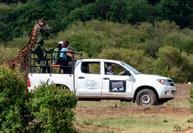




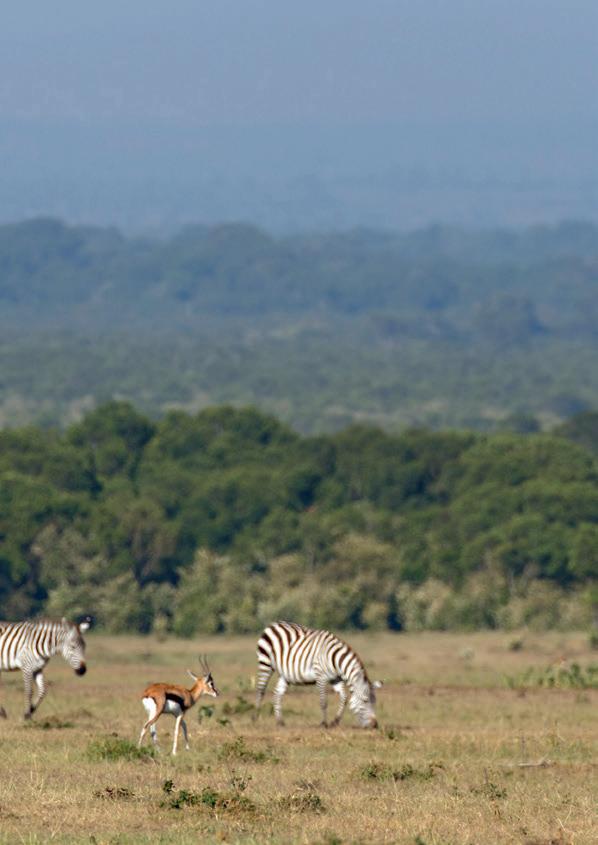
Beyond the big five: Defending the Kenyan Maasai Mara from biodiversity loss
This lion, leopard, cheetah, elephant and African biodiversity conservation volunteer expedition to Kenya will take you to the world-famous Maasai Mara, one of the natural wonders of the world, to monitor and defend its biodiversity. Species to be monitored include leopard, lion, cheetah, elephant, buffalo and a host of ungulates such as giraffe, zebra, eland, impala, wildebeest, as well as other flagship African species. You will be working as part of an international team, based at a very comfortable field station with all modern amenities. You will be covering ground in off-road vehicles and on foot, and conducting wildlife monitoring activities such as camera trapping, target species searches, transect and species identification work, as well as data entry. All this in an effort to ascertain population diversity and abundance, and to work with local people and communities to find successful strategies for coexistence with wildlife in this iconic African landscape.
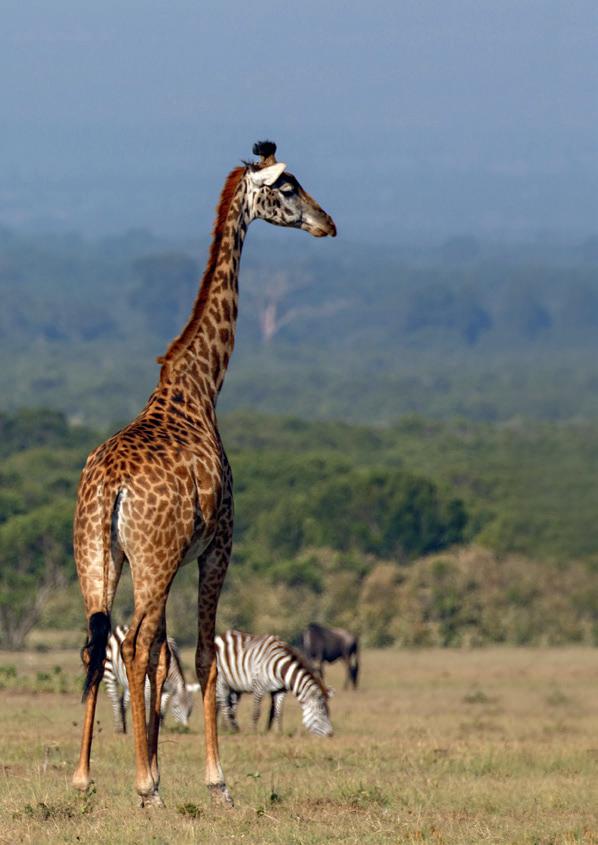
There’s no getting around it, the UK’s once equable climate is falling apart. We are now firmly on course for hothouse Britain and the signs are all around us. Just three years ago, the mercury hit 38.7C in Cambridge – then an all-time record. A year later, meteorologists at the UK Met Office mocked-up a weather forecast for 2050, showing 40C-plus temperatures across much of the UK.
But the speed of climate breakdown is such that this future is already upon us. The Met Office’s first-ever red extreme heat warning came into force for much of England in July, as ferocious 40C-plus temperatures overwhelmed ambulance services and A&E departments and brought heat-related deaths.

And this is just the beginning. When our children are our age, they will yearn for a summer as “cool” as 2022, because long before the century’s end, 40C-plus heat will be nothing to write home about in the climatemangled world they inherit.
The brutal truth is that dodging dangerous, all-pervasive, climate breakdown is now practically impossible. Even if all the promises and pledges made at Cop26 were kept, we would still be lucky to stay below a 2C rise, and if tipping points are crossed and feedbacks kick in, the figure could be much higher. So, hothouse Britain is a reality, and the sooner we face this fact, the better. And be very clear, this isn’t alarmist. It isn’t what deniers are fond of calling “climate porn”. This is simply how things are.
In the decades ahead, summers are set to get ever hotter and last longer, overwhelming the other seasons, and reducing winter to a couple of dreary months punctuated by damaging storms and destructive floods. Blistering heat will be the default weather for July and August, when a combination of high temperatures and humidity will make sunbathing and working in the open extremely unpleasant and potentially deadly. Our poorly insulated homes will provide little respite as they are turned into unliveable heat-traps. Camping out in gardens and parks will become commonplace as baking nights make sleeping indoors impossible. Inevitably, increasing numbers of people will flee the cities to escape the heat-island effect that will transform them into unbearable saunas. A general migration northwards and uphill can be expected, as cooler conditions become a big property selling point.
But hothouse Britain is about far more than insufferable summer heat. Progressive climate breakdown will affect everyone and insinuate itself into every aspect of our lives. Transport and energy infrastructure will succumb repeatedly to the onslaught of extreme weather, making
In hothouse Britain, wildfires will become more frequent, as will destroyed houses and communities as a result of those fires. © S. Salam
In hothouse Britain, coastal communities will fight a losing battle as increasingly powerful waves overcome sea defenses.
 © B. Kitchener
© B. Kitchener
otherwise straightforward journeys increasingly problematical, and power outages a normal part of daily life.
Health and wellbeing services will buckle, as tens of thousands of the most vulnerable people struggle in the growing heat and humidity, cases of poisoning due to heat-related food and water contamination burgeon, and new diseases suited to the hotter conditions – including malaria and dengue fever – gain a foothold. An explosion in mental health problems is also foreseen as living conditions become ever more desperate for many, and the strain on individuals and families takes its toll.
A confluence of desiccating drought, torrential rains and battering hail, flooding and new pests that thrive in the heat will take a massive toll on crops at a time when frequent harvest failures and climate wars will mean an erratic and unreliable supply from overseas. We have already seen price hikes and gaps on supermarket shelves as a consequence of the Ukraine conflict. Climate breakdown will bring far worse. One study predicts that by 2050 the world will need half as much food again, while crop yields could be down by as much as 30%. This is nothing less than a recipe for widespread hunger, social unrest and civil strife, and the UK is unlikely to be immune.
Heat and drought will be the signature conditions of hothouse Britain, but there will still be rain. In the summer, downpours fed by convective storms will be so heavy that little rain will penetrate the ground, most of it flowing over the surface to feed lethal and destructive flash floods. Autumn and winter will see frequent incursions of powerful, damaging, storms and so-called atmospheric “rivers”, bringing rains that last for days on end, overwhelming catchments and driving river flooding on a biblical scale.
Coastal communities will fight a losing battle as bigger and more frequent storm surges, increasingly powerful
waves and a remorseless hike in sea level supercharge cliff erosion and permanently swamp low-lying terrain. Sea level is now rising by a centimetre every two years, which is more than double the rate for the period 19932002. Within 80 years it will certainly be more than a metre higher, and could have climbed by 2m or even more. This would bring the North Sea far inland, threatening especially low-lying communities such as the Lincolnshire towns of Boston and Spalding.
Alongside rapid emissions cuts, the inevitability of climate breakdown makes adaptation desperately urgent. Now should be the time for massive government investment in resilient infrastructure and the preservation of health and wellbeing – but there is little sign of this. Our housing stock remains totally unprepared for the new summer temperatures and flood plains are still being concreted over for new estates; meanwhile, transport and energy networks continue to be dangerously exposed to the vagaries of flood, wind and excessive heat. No plans exist, either, for a national water grid that could ease future drought conditions. The bottom line is that every decision – from local government upwards – needs to be made in light of building resilience to climate breakdown as well as slashing emissions. But this just isn’t happening.
If you are terrified by what you have read, then I have done what I set out to do. Too many of us still think that global heating will just mean that the world will get a bit warmer and that somehow we will muddle through. This is plain wrong. So be scared, but don’t let this feed inertia. Instead channel the emotion and use it to launch your contribution to tackling the climate emergency. Things are going to be dreadful, but – working together – we still have the time to stop a dangerous future becoming a cataclysmic one. ■







in cooperation with
From elephants to cats to butterflies: Monitoring biodiversity of Vwaza Marsh Wildlife Reserve, Malawi, Africa
This African wildlife conservation project will take you to the little known, but species-rich and quintessentially African Vwaza Marsh Wildlife Reserve in Malawi to monitor four out of the Big Five (elephant, buffalo, leopard and lion), as well as hippo, primates and antelopes. You will be working as part of an international team, based at a rustic but comfortable field camp. You will be covering ground in off-road vehicles and on foot, and conducting research activities such as live and camera trapping, target species searches, transect and species identification work, as well as data entry. All this in an effort to help local scientists assess the nature and patterns of biodiversity in Vwaza Marsh Wildlife Reserve and to inform biodiversity monitoring and management in order to protect this relatively untouched part of Africa for future generations.

Expedition contributionDurationTime of yearMeeting point €2880 13 daysSep 2023 Lilongwe
More info and exact dates www.biosphere-expeditions.org/malawi
“
Climate activists are sometimes depicted as dangerous radicals, but the truly dangerous radicals are the countries that are increasing the production of fossil fuels.”
– United Nations Secretary General Antonio Guterres
I’m a climate scientist and a desperate father. How can I plead any harder? What will it take? What can my colleagues and I do to stop this catastrophe unfolding now all around us with such excruciating clarity?
Recently I was arrested for locking myself to an entrance to the JP Morgan Chase building in downtown Los Angeles with colleagues and supporters. Our action in LA is part of an international campaign organised by a loosely knit group of concerned scientists called Scientist Rebellion, involving more than 1,200 scientists in 26 countries and supported by local climate groups. Our day of action follows the recent IPCC Working Group 3 report, which details the harrowing
The movie "Don't look up" tells the story of two astronomers attempting to warn humanity about an approaching comet that will destroy human civilisation. They are roundly ignored and ridiculed even when the comet, which eventually does destroy the planet, becomes visible. Peter Kalmus has described very similar experiences as a climate scientist trying to warn humanity about the dangers of climate breakdown and the need to act now. © kjpargeter (meteorite) and Netflix (movie poster)


gap between where society is heading and where we need to go. Our movement is growing fast.
We chose JP Morgan Chase because out of all the investment banks in the world, JP Morgan Chase funds the most new fossil fuel projects. As the new IPCC report explains, emissions from current and planned fossil energy infrastructure are already more than twice the amount that would push the planet over 1.5C of global heating, a level of heating that will bring much more intense heat, fire, storms, flooding, and drought than the present 1.2C.
Even limiting heating to below 2C, a level of heating that in my opinion could threaten civilization as we know it, would require emissions to peak before 2025. As UN Secretary General Antonio Guterres said in the IPCC Working Group press conference: “Investing in new fossil fuel infrastructure is moral and economic madness.” And yet, this is precisely what President Biden, most other world leaders, and major banks are doing. It’s no exaggeration to say that Chase and other banks are contributing to murder and neocide through their fossil fuel finance.
Earth breakdown is much worse than most people realise. The science indicates that as fossil fuels continue to heat our planet, everything we love is at risk. For me, one of the most horrific aspects of all this is the juxtaposition of present-day and near-future climate disasters with the “business as usual” occurring all around me. It’s so surreal that I often find myself reviewing the science to make sure it’s really happening, a sort of scientific nightmare arm-pinch. Yes, it’s really happening.
If everyone could see what I see coming, society would switch into climate emergency mode and end fossil fuels in just a few years.
I hate being the Cassandra. I’d rather just be with my family and do science. But I feel morally compelled to sound the alarm. By the time I switched from astrophysics into Earth science in 2012, I’d realized that facts alone were not persuading world leaders to take action. So I explored other ways to create social change, all the while becoming increasingly concerned. I joined Citizens’ Climate Lobby. I reduced my own emissions by 90% and wrote a book about how this turned out to be satisfying, fun, and connecting. I gave up flying, started a website to help encourage others, and organised colleagues to pressure the American Geophysical Union to reduce academic flying. I helped organize FridaysForFuture in the US. I co-founded a popular climate app and started the first ad agency for the Earth. I
spoke at climate rallies, city council meetings, and local libraries and churches. I wrote article after article, open letter after open letter. I gave hundreds of interviews, always with authenticity, solid facts, and an openness to showing vulnerability. I’ve encouraged and supported countless climate activists and young people behind the scenes. And this was all on my personal time and at no small risk to my scientific career.
Nothing has worked. It’s now the eleventh hour and I feel terrified for my kids, and terrified for humanity. I feel deep grief over the loss of forests and corals and diminishing biodiversity. But I’ll keep fighting as hard as I can for this Earth, no matter how bad it gets, because it can always get worse. And it will continue to get worse until we end the fossil fuel industry and the exponential quest for ever more profit at the expense of everything else. There is no way to fool physics.
Martin Luther King Jr said, “He who accepts evil without protesting against it is really cooperating with it.” Out of necessity, and after exhaustive efforts, I’ve joined the ranks of those who selflessly risk their freedom and put their bodies on the line for the Earth, despite ridicule from the ignorant and punishment from a colonising legal system designed to protect the planet-killing interests of the rich. It’s time we all join them. The feeling of solidarity is a wonderful balm.
As for the climate scientists? We’ve been trying to tell you this whole time. ■

This SCUBA diving expedition will take you to the beautiful 26 coral atolls that make up the Republic of Maldives. Based on a very luxurious and modern liveaboard yacht, you will help marine biologists study and protect the Maldives' coral reefs and resident whale shark population. All this because the Maldives government identified a need for further research and monitoring work as far back as 1997. Biosphere Expeditions is addressing this need with your help and will train you as a Reef Check EcoDiver. With this qualification you will then gather important reef and whale shark data and you will also be eligible to apply for PADI or NAUI Reef Check Speciality Course certification after the expedition. Expedition









For the past year or so, I have been repeatedly listening to a critically acclaimed album, Ignorance, released in 2021 by the Canadian band the Weather Station. Its music is graceful, poised and smooth, but it is also an almost conceptual set of songs about the urgency of the climate crisis and the disorientation of living in a culture that still refuses to acknowledge it. According to its chief creator, the singer-songwriter and former actor Tamara Lindeman, many of its songs evoke what happens when “this veneer of ‘everything will be OK’ disappears”. That moment of revelation is perfectly captured in one song I have played over and over again – which is simply called Loss, and finds Lindeman recalling a conversation: “What was it last night she said? At some point you’d have to live as if the truth was true.”
Amid unprecedented temperatures, fires and the grim pantomime of governments in full denial of the crisis, I suspect more people than ever would now understand
those words as a matter of direct emotional experience. For millions of us, this summer’s heat was synonymous with an anxiety that is now impossible to shake off, and a renewed awareness of the small transgressions and outright hypocrisies that are required to get through each day. We perform them because of something that Lindeman’s lyrics consummately describe: that very human talent for just about averting our eyes from what is directly in front of us, so as to live a quiet life; and a political culture that just about keeps the “everything will be OK” veneer in place.
These are things evident across the planet, and the UK has its own grim versions of them. Elements of the Tory leadership have pledged to retain the current de facto ban on onshore windfarms; others want to reconsider some of the key policies built into the government’s milquetoast 2050 net zero target. The Labour party has one big climate policy – its £28bn-a-year climate investment pledge – but is still not putting global heating
anywhere near the centre of its basic message, and is thereby failing to acquire much consent for action on it.
Meanwhile, for a certain kind of media voice, it has been all about raging against climate sceptics and deniers and their influence on politics, as if pointing out that they are mendacious and dangerous is an act of bravery. The former BBC presenter Andrew Marr provided a good example in a monologue broadcast on his new show on LBC: “I for one have had enough of being told by pallid, shadowy, old businessmen and lazy ignorant hacks and sleazy lobbyists – who aren’t real scientists, any of them – that the science is wrong and that what is happening isn’t happening,” he said. “Enough!”
The key question of 2022 is not whether those people are wrong, both factually and morally: we know the answer to that. For the moment, I don’t think many people need to be thinking very much about particular parties or politicians. What we surely need to focus on is the deep attachment to fossil fuels still locked into our economy and political system, and how to help the movements that definitely want to end it: Extinction Rebellion (XR), Insulate Britain, Just Stop Oil and the other forces that clearly understand the unspeakable gravity of the moment. This comes down to a question that still does not intrude on politics nearly enough: as these groups take the most direct kind of action, do you support them? And if – or, rather, as – the climate emergency deepens and the awful gap between politics and the sheer scale of what we are faced with only widens, what will you think if their actions take new, ever-more disruptive forms?
To some extent, the way our media and politicians fend off the climate crisis accidentally confronts people with exactly those arguments. In one of our most regular national rituals, mainstream politics barely intrudes and instead, a protester fresh from some or other climate action is berated by Piers Morgan, Richard Madeley or one of the presenters from GB News or TalkRadio, and the only real options become clear: meaningful and radical action or nothing at all. A recent editorial in the Sun insisted that “we need a sober debate, free from the extremists’ juvenile panic, on how we inch towards Net Zero in decades to come”, which made panic look like much the more sensible option. In April, the Labour party demanded that the government take legal action to effectively ban climate protests that disrupt traffic and oil production. When he stood to be his party’s leader, Keir Starmer took donations from a former boss of the RAC and AA, and the latter company-cum-lobby group’s former chief financial officer. The people he apparently thinks should be locked up, by contrast, are motivated by a comparatively pure mission to confront the car industry and quickly finish the hydrocarbon era, and thereby avoid catastrophe. So who do you choose?
In some cases – Occupy is a good example here – sustained support for protesters and activists has bumped

up against their lack of a coherent agenda. But the modern climate movement is not like that. The basic position shared by the central handful of groups is clear enough: net zero by a much earlier date than 2050. XR and the people backing the climate and ecology bill –including such politicians as the Greens’ Caroline Lucas and Labour’s Clive Lewis – envisage that change being driven by citizens’ assemblies, set up to decide how such an aim will be reached. In the context of Westminster politics, such ideas may seem so unlikely as to be barely worth considering. But remember: Brexit is a madcap, massively disruptive project that defies just about every element of political and economic sense, but was until recently the preserve of cranks and obsessives and only became a reality when David Cameron decided to bypass MPs and ask the rest of us to decide. Less than a decade after it decisively burst into the political foreground, moreover, we are locked into it for keeps, with the support of both main parties. By comparison, is trying to set an example to other countries by doing exactly what the climate demands really so fanciful?
Activism and protest often trigger a kneejerk suspicion that they will alienate people and kill whatever cause they advocate. But experience suggests the exact opposite: just as successive waves of social reformers, the suffragettes and the anti-apartheid movement were stubborn, daring and creative enough to make their demands irresistible, so the people now lying in roads and charging into airports and refineries have conveyed the urgency of climate breakdown more successfully than anyone in a suit. There is a very good reason for that: it is only well outside centres of power that you can find the answer to a question that power and politics are dodging more than ever – how to live as if the truth is actually true. ■
Beautiful Brown bears: Studying bears in the quintessentially Scandinavian woodlands of Dalarna Province
This Swedish bear citizen science expedition will take you to the picturesque and quintessentially Scandinavian countryside of Dalarna province in Sweden to help study and protect the local brown bear population. Working in small teams, in flat or gently rolling hill terrain of heath, forests and wetlands, you will find and document bear winter dens and summer day beds when the bears are away (you will be able to tell this from their GPS position or collar signals). Detailed knowledge about dens and denning behaviour is important, because it helps to avoid human-bear conflict and provides important population, reproductive and other ecological information that is critical for successful bear conservation. Expedition








The risk of global societal collapse or human extinction has been “dangerously underexplored”, climate scientists have warned in an analysis.
They call such a catastrophe the “climate endgame”. Though it had a small chance of occurring, given the uncertainties in future emissions and the climate system, cataclysmic scenarios could not be ruled out, they said.




“Facing a future of accelerating climate change while blind to worst-case scenarios is naive risk management at best and fatally foolish at worst,” the scientists said, adding that there were “ample reasons” to suspect global heating could result in an apocalyptic disaster.
The international team of experts argue the world needs to start preparing for the possibility of the cli-
Tipping elements in the Earth's climate system, based upon Lenton et al. (2008) © CodeOne. See also the 2022 Magazine for more information on boundaries and tipping points.
mate endgame. “Analysing the mechanisms for these extreme consequences could help galvanise action, improve resilience, and inform policy,” they said.
Explorations in the 1980s of the nuclear winter that would follow a nuclear war spurred public concern and disarmament efforts, the researchers said. The analysis proposes a research agenda, including what they call the “four horsemen” of the climate endgame: famine, extreme weather, war and disease.
They also called for the Intergovernmental Panel on Climate Change to produce a special report on the issue. The IPCC report on the impacts of just 1.5C of heating drove a “groundswell of public concern”, they said.
“There are plenty of reasons to believe climate change could become catastrophic, even at modest levels of warming,” said Dr Luke Kemp at the University of Cambridge’s Centre for the Study of Existential Risk, who led the analysis. “Climate change has played a role in every mass extinction event. It has helped fell empires and shaped history.
“Paths to disaster are not limited to the direct impacts of high temperatures, such as extreme weather events. Knock-on effects such as financial crises, conflict and new disease outbreaks could trigger other calamities.”
The analysis is published in the journal Proceedings of the National Academy of Sciences and was reviewed by a dozen scientists. It argues that the consequences of global heating beyond 3C have been underexamined, with few quantitative estimates of the total impacts. “We know least about the scenarios that matter most,” Kemp said.
A thorough risk assessment would consider how risks spread, interacted and amplified, but had not been attempted, the scientists said. “Yet this is how risk unfolds in the real world,” they said. “For example, a cyclone destroys electrical infrastructure, leaving a population vulnerable to an ensuing deadly heatwave.” The Covid pandemic underlined the need to examine rare but high-impact global risks, they added.
Particularly concerning are tipping points, where a small rise in global temperature results in a big change in the climate, such as huge carbon emissions from an Amazon rainforest suffering major droughts and fires. Tipping points could trigger others in a cascade and some remained little studied, they said, such as the abrupt loss of stratocumulus cloud decks that could cause an additional 8C of global warming.
The researchers warn that climate breakdown could exacerbate or trigger other catastrophic risks, such as
international wars or infectious disease pandemics, and worsen existing vulnerabilities such as poverty, crop failures and lack of water. The analysis suggests superpowers may one day fight over geoengineering plans to reflect sunlight or the right to emit carbon.
“There is a striking overlap between currently vulnerable states and future areas of extreme warming,” the scientists said. “If current political fragility does not improve significantly in the coming decades, then a belt of instability with potentially serious ramifications could occur.”
There were further good reasons to be concerned about the potential of a global climate catastrophe, the scientists said: “There are warnings from history. Climate change has played a role in the collapse or transformation of numerous previous societies and in each of the five mass extinction events in Earth’s history.”
New modelling in the analysis shows that extreme heat – defined as an annual average temperature of more than 29C – could affect 2 billion people by 2070 if carbon emissions continue.
“Such temperatures currently affect around 30 million people in the Sahara and Gulf Coast,” said Chi Xu, at Nanjing University in China, who was part of the team. “By 2070, these temperatures and the social and political consequences will directly affect two nuclear powers, and seven maximum containment laboratories housing the most dangerous pathogens. There is serious potential for disastrous knock-on effects.”
The current trend of greenhouse gas emissions would cause a rise of 2.1-3.9C by 2100. But if existing pledges of action are fully implemented, the range would be 1.9-3C. Achieving all long-term targets set to date would mean 1.7-2.6C of warming.
“Even these optimistic assumptions lead to dangerous Earth system trajectories,” the scientists said. Temperatures more than 2C above pre-industrial levels had not been sustained on Earth for more than 2.6m years, they said, far before the rise of human civilisation, which had risen in a “narrow climatic envelope” over the past 10,000 years.
“The more we learn about how our planet functions, the greater the reason for concern,” said Prof Johan Rockström, at the Potsdam Institute for Climate Impact Research in Germany. “We increasingly understand that our planet is a more sophisticated and fragile organism. We must do the maths of disaster in order to avoid it.” ■



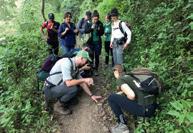



in cooperation with
Elephant
Asian elephants in the hills of northern Thailand to increase their welfare and conservation

This expedition will take you to the tropical highlands and Himalayan foothills in the shadow of Thailand’s tallest peak (Doi Inthanon at 2,565 m). There you will conduct close-encounter behavioural and other studies on Asian elephants to make an important contribution to elephant conservation in Thailand. Our study elephant herd lives in the forested area surrounding a remote hill tribe village, where the expedition is based in the community. The expedition will also work on general biodiversity monitoring, as well as education, capacity-building and incentive creation for local people, which are all vital if elephants are to have a future in Thailand living side-by-side with humans.
Expedition contributionDurationTime of yearMeeting point
€ 2290 9 daysOct 2023 Chiang Mai
More info and exact dates www.biosphere-expeditions.org/thailand
Greenwich Park, London, in August 2022, savaged by drought and record summer temperatures © A. Hickson

Also in London in 2022: protest to end the era of fossil fuels © A. Hickson

The world is ablaze and the oil industry just posted record profits – it’s us or them.
It is useful to think of capitalism as a robotic savant, spectacularly gifted at doing one thing and cripplingly blind to everything else. Global capitalism is an incredible machine for extracting fossil fuels from our planet, refining them, shipping them to every corner of the Earth and making staggering amounts of money doing so. The humming of this machine, the fuel and the money that it spits out, has powered a century of unprecedented production and consumption by the Earth’s first-world nations. Unfortunately the machine is also poisoning us all. But one of its exquisitely evolved functions is to make it almost impossible to turn it off.
Oil and gas profits in the most recent quarter were astounding. Exxon Mobil made $18bn in profits in the past three months. Shell and Chevron each made nearly $12bn. Those are all record numbers. The war in Ukraine, which has devastated a region of the world and displaced millions, has helped energy companies by driving oil and gas prices higher. In this, we see another key characteristic of the machine: the fortunes of nations may rise and fall, but the oil companies will always survive and thrive, floating above the chaos of the world like passengers on a private jet, shaking their heads performatively at all the problems below.
The price of oil fluctuates, but that short-term volatility masks the industry’s long-term certainty of success. A recent study showed that for the past 50 years, the oil industry has made profits of more than $1tn a year, close to $3bn a day. These profits are driven not by some fantasy of free enterprise and perfect competition, but by the exact opposite – cartels, mega-corporations and the regulatory capture of governments, conspiring to create a market free of both competition and of a price that reflects the actual cost to the world of the product that is being sold.
Fossil fuels make enough money to corrupt politicians, cause wars and bend public opinion through the brute force of a firehose of propaganda. The machine does not just extract and sell fossil fuels; it also concerns itself with ensuring that the entire world is arranged in a way conducive to maintaining the demand for those fossil fuels. The growth of oil profits even as the reality of climate change is burning before our eyes is proof that no single crisis, no matter how existential, will be enough to shut this machine down naturally. The machine must either be broken by us, or it will break us all.
Capitalism is not designed to look several generations down the road. It is not designed to sacrifice for the greater good. It is designed to maximise profits. To pump every last barrel of oil on Earth, sell it, take the money and build a luxurious space ship to leave the planet that has been destroyed by burning all of that gas is a perfectly rational course of action according to the logic of capitalism. As long as there is a trillion dollars a year to be made, the fossil fuel industry will take the money. It is enough money to build a nice villa far,
far away from the wars and droughts and floods and wildfires that fossil fuels are causing.
These profits are illusory. They are plagued by an externality large enough to outweigh a trillion dollars a year – the costs that the climate crisis will impose on billions of people who are alive now and many generations to come. The fact that capitalism is unable to price properly a barrel of oil to account for all the pain it will cause to your grandchildren whose home is wiped out by rising seas is proof that the whole idea of an impartial system of costs and rewards for labor and risks is a big sham.
The fossil fuel industry as a whole is not just another business, providing a service to meet a demand; it is a predatory drug dealer that works every day to keep the world addicted to its poisonous product, knowing full well that it will eventually prove fatal. It fights to keep the population fooled about its costs, to keep the political power structure incapable of keeping the public safe from its damages, and to keep the flow of supply coming at full blast despite any human or environmental toll. It is not something to be applauded. It is a problem to be solved.
It’s no big mystery how to change this toxic dynamic. Merely putting a price on fossil fuel that accurately reflects its costs – for example, through a carbon tax – would do the trick, with time, as it rapidly became economically unfeasible to mortgage the health of the planet’s future on a carbon credit card. Better, and faster, would be straightforward regulations paired with enormous public investments to transition to cleaner energy sources, a la the Green New Deal. The barrier here is not ideas, but rather politics, backstopped with a wall of money. So long we fail to regulate the influence of money in politics, we will by extension fail to regulate fossil fuels adequately.
It is folly to assume that a system that has been constructed in part by the corporate power of the energy industry will find a way to rein in that same industry against its wishes. It’s willfully stupid to imagine that electoral politics will be up to this task. This is an issue that is, more than most, begging for radicalism. It will take more than installing a solar panel on your roof. For older people with means, it will take agitating within each and every institution you are a part of to divest from the fossil fuel industry; for younger people with passion, it will take agitating in the streets. For all of us, it will take treating the tremendous but slow-moving threat of climate change with the deadly seriousness it deserves.
So next time you see young people sitting in at a politician’s office or blocking the streets, don’t mock them. Join them. They will be living through a grim future long after all that sweet oil money has been spent. ■



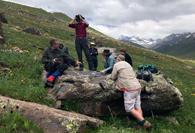



Mountain ghosts: Protecting snow leopards and other animals of the Tien Shan mountains of Kyrgyzstan
This snow leopard conservation project will take you to the remote, spectacular and beautiful Tien Shan mountains of Kyrgyzstan to survey snow leopards, as well as their prey animals such as the argali mountain sheep, the Central Asian ibex, marmots and others. You will be working as part of a small international team from a mobile tented base camp set at various locations and altitudes of around 2000 m (where altitude sickness is not an issue). You will be covering ground in the expedition vehicles and on foot, looking for tracks, kills, scats and the animals themselves, and setting camera traps. True expedition-style base camp conditions, testing but satisfying mountain surveying, off-road driving and the breathtaking high mountains make this a challenging, but very rewarding expedition. Expedition

Our planet is in an undeniable, human-induced crisis, heading towards the wall at high speed. Here are our top 5 tips of what you - as an indivudal and a global citizen and inhabitant of this planet - can do right now to help ensure our children and grandchilden can still inherit a liveable planet.
More details and links with background information about this is at www.biosphere-expeditions.org/5tips
Raising meat for human consumption requires 160 times more land and causes 11 times more greenhouse gas emissions when compared to crops like wheat, rice or potatoes. Shifting to a plant-based diet will reduce global land use, free up land to restore depleted ecosystems, and successfully feed the world population. For example, on a vegan diet, the UK could feed 220 million people. In addition, a meatless diet also boasts improved overall health and reduces grocery bills. And this is even before we consider animal welfare issues and the ethics of rearing and killing animals for their meat. Like giving up smoking, this is a no-brainer and there really is no reason to continue eating meat (not even the enduring protein myth). This is why all our expeditions are vegetarian. So switch to a vegetarian or vegan diet now, then buy locally produced plant-based food and you are on a very significant winner for the planet.

Come off the fashion bandwaggonbuy no more than three new items of clothing per year
The environmental impact of the fashion industry is huge, but not well known. It is responsible for 8-10% of humanity’s carbon emissions – more than all international flights and maritime shipping combined. It uses some 93 billion cubic metres of water annually – enough to meet the needs of five million people – contributing significantly to water scarcity in some regions. And it produces around 20% of industrial waste water pollution worldwide. Do not feed that monster any longer and come off the fashion bandwaggon, especially fast fashion.


Flying is very energy-intensive, dependent on fossil fuels and bad news for the planet. Because aircraft emissions are released high in the atmosphere, where they trigger chemical reactions and atmospheric effects, they heat the planet more than any other industry. At the same time, generous subsidies mean that passengers do not see the true environmental costs of their air travel. To make matters worse, emissions from aviation are growing faster than any other mode of transport. If unmitigated, aviation emissions are expected to double or triple by 2050 and in doing so consume up to one-quarter of the global carbon budget under a 1.5C scenario. And carbon offsetting is just a fig leaf. All this means that you should stop flying or reduce flying to an absolute minimum. For example, we recommend that you choose an expedition that you can reach by car or train instead of one you have to fly to. All our staff only fly if absolutely necessary.
Cars have a significant footprint - from very environmentally costly production to burning fossil fuels with harmful emissions that drive climate change and contribute to poor air quality, to standing around 95% of the time, clogging up our cities, to difficult recycling and filling up landfills. If you live in a city with car share options, then switch to this. If you live rurally, use your existing car until end of life, use ride share or car pool options, and travel on public transport whenever you can. Biosphere Expeditions has gone down the car free route: we no longer own any cars and now use car share, car hire or existing vehicles of staff, partners or participants whenever we can.
Make yourself aware of and accept the dire situation the planet and humankind is in. The NASA and Monbiot sites are a good starting point. as are our 2022 and 2023 annual magazines. But do not despair, channel your frustration into activism instead! Tell your politicians and leaders what you think and ask them to do more of the things you care about. Be aware, though, that this might not work as neoliberalism and corporations have captured our democratic processes and institutions.
Given the situation we are in, it has been argued that only rebellion will prevent ecological collapse, and we tend to agree. So consider joining revolutionary organisations based on activism and civil disobendience (such as Eradicating Ecocide, Client Earth, Extinction Rebellion and Fridays for Future), because facts about our ecological crisis are incontrovertible and sitting on our hands is simply no longer good enough. We need 3.5% of the population to reshape society and we have a duty to act to save our planet from sliding into destruction, if we want to be able to look our grandchildren in the eye!

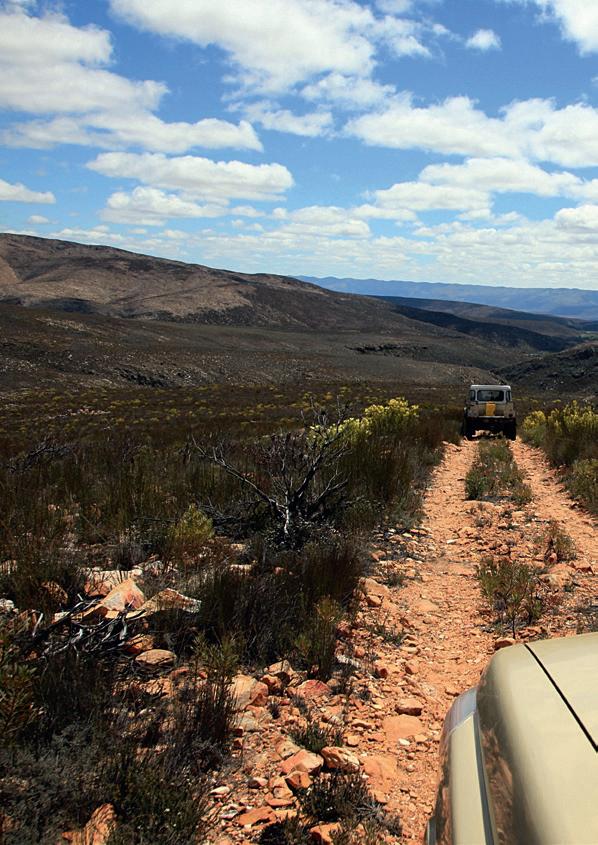
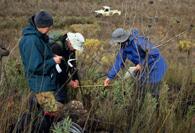
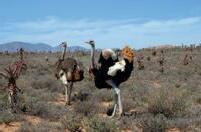




Note that our scientist for this expedition is on sabbatical in 2023, so this expedition will return in 2024
Carnivores of the Cape Floral Kingdom: Surveying Cape leopards and biodiversity in the fynbos mountains of South Africa
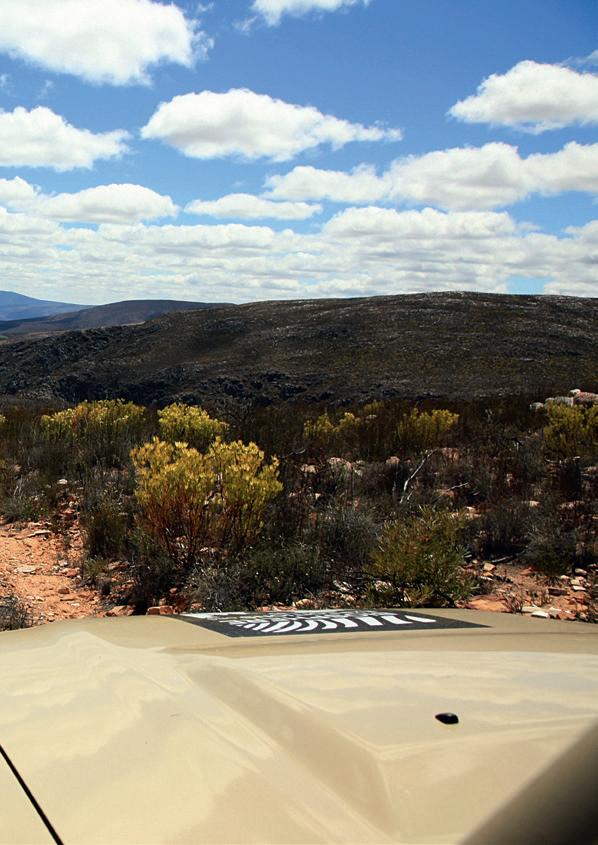
This expedition will take you to South Africa’s beautiful Cape Floral Kingdom (fynbos), a UNESCO World Heritage Site and the world’s only biome contained within one country, to conduct a survey of leopard and fynbos biodiversity and to experience African fauna (such as buffalo, giraffe, eland, kudu, zebra, etc.). Based in a remote mountainous part of the Western Cape on a comfortable former farmstead with all modern amenities, you will first learn some bush skills and then conduct surveys on foot, mountain bike or car. You will also set camera traps, conduct game counts and you may assist with cat capturing and collaring, and other studies that may be ongoing at the research site at the time, such as bird, tortoise or flower monitoring. All this in an effort to mitigate human-wildlife conflict and create a sustainable future for all.
Expedition contributionDuration Dates Meeting point €2590 13 daysOct 2024 (!)George
More info and exact dates www.biosphere-expeditions.org/southafrica
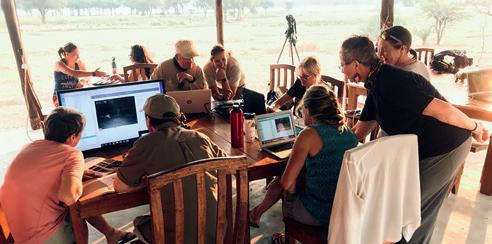
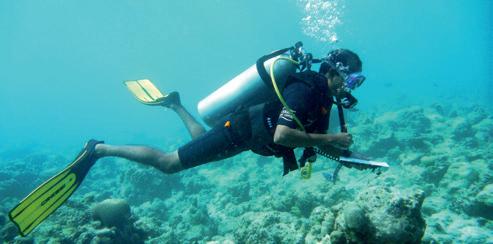
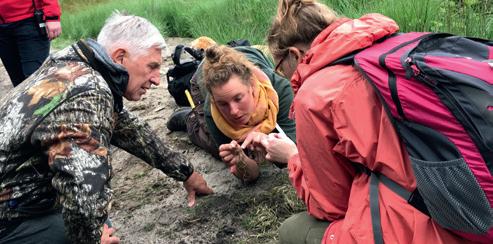
Perhaps you are reading this on expedition and feel inspired to change your habits in a positive way. Perhaps you are reading this at home and want to support Biosphere Expeditions in additional ways. Whatever your motivation, here are some tips on what you can do for the planet, for yourself and for Biosphere Expeditions. BE (radically) GREEN
1The undeniable crisis our planet is in demands more action and activism. It demands a radical rethink of how we run our lives, societies and the way we treat our planet. Our Top 5 Tips list the top actions each of of can take: stop to eat meat, get rid of your car, stop flying (to expeditions and instead select a more local one), come off the fashion bandwaggon and become an activist! Our 20 tips on how to be (radically) green go from the light green of what we should all do as a bare minimum, to the dark green rejection of neoliberalism and the fallacy of endless growth, to joining the revolution that is gathering pace as we speak. Because sitting on our hands is simply not an option any more. We have a duty to act if we want to be able to look our grandchildren in the eyes.
SPREAD THE WORD
www.biosphere-expeditions.org/domore#words

2Help us to help wildlife and people across the world by spreading the word. Word of mouth is by far the best way to get people excited. Talk to your family, friends, and colleagues about your experience and encourage them to join in too.
Share your experience, comments, pictures and videos on your social media and ours. This really does help to spread the word about us and our conservation work.
Independent reviews are very important for us, not just for those thinking about joining an expedition, but also for our staff, scientists and partners who draw great motivation and encouragement from them. So we would be very grateful if you could write a review on our Facebook review page and/or on GreatNonProfits.
Host an event for us in your neck of the woods, or give a presentation. Examples include holding a drinks reception in a local pub, a dinner party at your home, a talk/presentation at your local wildlife or conservation society,
The full text with explanations, background, references and links is also on www.biosphere-expeditions.org/domore
a get-together at your professional organisation or club, or anything else you can think of. We can send you support materials such as presentations, as well as postcards and brochures that you can hand out at your event. In addition, a staff member of Biosphere Expeditions may be able to attend with enough prior notice.
Local newspapers and radio stations are always looking for new stories, and they are very likely to want to hear about your experiences. Biosphere Expeditions has an extensive storage of high resolution photos and broadcast quality HD films, so please contact us if you need pictures or film clips to illustrate your story or if you would like help with your press release or media work.
Are you a blogger? If so, why not create a blog about Biosphere Expeditions and/or your expedition experience and link it through to us. This will also help to get the word out there. If you do create a blog, make sure you let us know about it, so we can link back to you.
Videos and pictures work really well in getting people's attention. If you are putting your expedition pictures or videos on a sharing site such as Instagram or YouTube, then please also make sure you link through to us or tag your pictures to Biosphere Expeditions as this will also help to spread the word.
We would like to build up a library of expedition team members' personal video diaries. There are no limits to your creativity other than we ask that your final cut is no longer than 6 minutes.
CONTRIBUTE YOUR TIME & SKILLS www.biosphere-expeditions.org/ domore#skills
We always need people with skills who can help us out. Examples are skills in the outdoors, accounting, graphic design, IT, social media, research, etc.

JOIN THE FRIENDS OF BIOSPHERE EXPEDITIONS

www.biosphere-expeditions.org/friends

4The Friends of Biosphere Expeditions are people who feel passionate about providing continuous support to our critical wildlife conservation and research projects across the globe. By joining the Friends you can play a vital part in making a real difference to the survival of our planet’s endangered species.
If you can't take part in a full-blown expedition yet, or if you have already been with us and would like to stay involved, or if you would simply like to be part of what we are doing, then become a Friend of Biosphere Expeditions today!
Help us to support critical wildlife conservation and research projects across the globe from a monthly membership fee starting at €10 | £10 | US$12 | AU$15. Depending on your country of residence, your membership fee may be tax-deductible (for example membership fees to our US 501(c)(3) charity, or our German e.V. charity, where we can issue tax-deductible receipts).
To join the Friends, just send us an e-mail. We will then sort out the rest together.
Friends membership benefits include expedition and events discounts, the Biosphere Expeditions Magazine, first notification and preference for last-minute expedition places, news and updates on how your membership fee is making a difference to our conservation work in the field and much more.
Wondering where your money will go? We guarantee that 100% will go into supporting conservation. We can do this because we are a small, flexible organisation with no steel and glass headquarters to maintain or bureaucratic dinosaurs to feed. Whenever we make a significant expenditure on one of our conservation projects from the Friends’ funds, we will let you know in a clear and transparent way. For example, we may spend some of the fund to enable scientists from different projects to present the findings of their Biospheresupported projects at international conservation conferences, or we may spend some of the fund on printing education materials for local people, or on training up a local conservationist under the guidance of our project scientists, or creating placements on our expeditions for local students and people.
We were poised for more placements and activities when the pandemic hit. With no expeditions running from March 2020 onwards, no placements or other activities took place. Instead we battened down the hatches, financially and otherwise, and are riding out the storm. To help our conservation partners around the world, we started three successive fundraisers (see pages 24-25) and focused our energies on those. Friends' funding and activities will resume when expeditions do in 2022.
DONATE www.biosphere-expeditions.org/domore#donate
5Our work on the ground of course continues after you have left. If you would like to donate to a particular expedition or Biosphere Expeditions as a whole, then please get in touch. We can then discuss how and what tax benefits you may receive.
Depending on your country of residence, your membership fee or donation may be tax-deductible (for example membership fees or donations to our US 501(c) (3) charity, or our German e.V. charity, where we can issue tax-deductible receipts or German "Spendenbescheinigungen"). We also have a page on employer match-giving and personal taxation, which you may want to check.
You may have laptops, GPSs, video cameras, binoculars or other items to give away, which we or our partners can use. If so, please let us know and we will either use them ourselves on our wildlife conservation projects or pass them on to our local partners.


www.biosphere-expeditions.org/ match-giving#fundraising


6Does your company publish a company magazine? If so, the editor would probably be very interested to hear from you as they are always keen to cover interesting features relating to their members of staff.
Many employers, particularly in the USA and Canada, but also elsewhere, will match-fund charitable contributions made by their employees, retirees and employees’ spouses. In Biosphere Expeditions' case this means that your employer may match-fund your expedition contribution payments and other donations you make to Biosphere Expeditions. Some employers also provide matching funds to support employee volunteer hours.
Some companies also have grants for non-profit organisations such as Biosphere Expeditions, so why not talk to relevant people in your company? You may have a Corporate Responsibility Manager, or an Environmental Manager or a Communications or Sustainability Manager who may be able to help you.
Support critical wildlife conservation and vital research by raising funds for Biosphere Expeditions. There are many ways to do this. Why not organise an event, or take part in a sporting endeavour? It’s fun, a great way to meet people and to do something different to challenge yourself. By raising funds you can make a longlasting contribution to our wildlife conservation work worldwide.

Volunteer at your local nature park or reserve and help support organisations that look after our wild places. Many organisations will train volunteers to undertake physical work such as scrub removal or tree planting, as well as organising surveys of different species, so go along to your local nature organisations and see if you can take part in some invasive plant removal or a butterfly survey, or help count frogs, birds or a myriad of other species.
Combining conservation with your holiday is a growing trend. Combining some time away from work or domestic chores with a great outdoors experience is good for our mental health as well as the environment. NGOs such as Blue Ventures, Operation Wallacea and Biosphere
Expeditions organise trips to many places around the world in support of working in remote and challenging places so that you can work alongside them and help them out in the field. Remember not to fly, if at all possible, or, if you have to, make your flight really count!
USE OUR AFFILIATES NETWORK www.biosphere-expeditions.org/affiliates
8You can also support Biosphere Expeditions through the affiliates network. Whatever the affiliate and our arrangement with them, commissions and perks gained from you using their services will always be ploughed back into our research and conservation work and to benefit our local partners wherever possible. n


